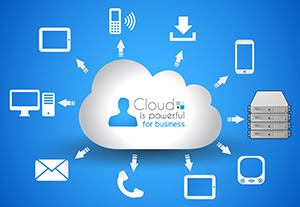
Cloud computing provides a way for your business to manage your computing resources online. The term has evolved over recent years, and can be used to describe the use of a third party for your storage and computing needs
The 'cloud' refers to the internet, and operating 'in the cloud' describes the way you store and access your data through an internet connection.
Cloud computing allows businesses to access their information virtually, creating a flexible and global way of accessing your data any place, any time.

Advantages of Cloud Computing
Reduced IT costs
Moving to cloud computing may reduce the cost of managing and maintaining your IT systems. Rather than purchasing expensive systems and equipment for your business, you can reduce your costs by using the resources of your cloud computing service provider. You may be able to reduce your operating costs because:
- the cost of system upgrades, new hardware and software may be included in your contract
- you no longer need to pay wages for expert staff
- your energy consumption costs may be reduced
- there are fewer time delays.
Scalability
Your business can scale up or scale down your operation and storage needs quickly to suit your situation, allowing flexibility as your needs change. Rather than purchasing and installing expensive upgrades yourself, your cloud computer service provider can handle this for you. Using the cloud frees up your time so you can get on with running your business.
Business continuity
Protecting your data and systems is an important part of business continuity planning . Whether you experience a natural disaster, power failure or other crisis, having your data stored in the cloud ensures it is backed up and protected in a secure and safe location. Being able to access your data again quickly allows you to conduct business as usual, minimising any downtime and loss of productivity.
Collaboration efficiency
Collaboration in a cloud environment gives your business the ability to communicate and share more easily outside of the traditional methods. If you are working on a project across different locations, you could use cloud computing to give employees, contractors and third parties access to the same files. You could also choose a cloud computing model that makes it easy for you to share your records with your advisers (e.g. a quick and secure way to share accounting records with your accountant or financial adviser).
Flexibility of work practices
Cloud computing allows employees to be more flexible in their work practices. For example, you have the ability to access data from home, on holiday, or via the commute to and from work (providing you have an internet connection). If you need access to your data while you are off-site, you can connect to your virtual office, quickly and easily.
Access to automatic updates
Access to automatic updates for your IT requirements may be included in your service fee. Depending on your cloud computing service provider, your system will regularly be updated with the latest technology. This could include up-to-date versions of software, as well as upgrades to servers and computer processing power.
There is also great choice in the level of security and management required in cloud deployments, with an option to suit almost any business:
- Private Cloud
- Public Cloud
- Hybrid Cloud
Moving away from deployment models, broadly speaking there are 3 models of cloud computing which describe the service on offer;
- Software as a Service (SaaS)
- Platform as a Service (PaaS)
- Infrastructure as a Service (IaaS)
